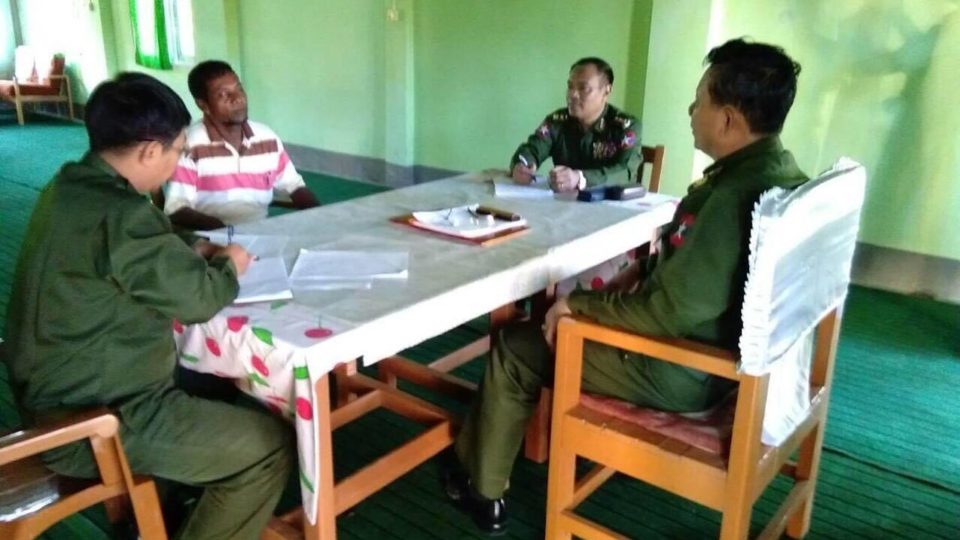Rights groups have slammed a report released by the Myanmar military on Monday following an internal review of its operations in northern Rakhine State over the last three months. Amnesty International and Human Rights Watch have accused the military Investigation Team that compiled the report of “whitewashing” ethnic cleansing and crimes against humanity and called for renewed international efforts to ensure an independent, impartial investigation of the military’s alleged abuses against Rohingya civilians.
The Investigation Team, led by the defense services inspector general Lt. Gen. Aye Win, claims that while 376 “terrorists” were killed in the military’s clearance operations in Maungdaw, Buthidaung, and Rathedaung townships since August 25, there was “no death of innocent people.”
“The security forces were only fighting against the ARSA Bengali terrorists. They never shot at the innocent Bengalis,” the report says.
The report’s claims stand in stark contrast with the testimonies of Rohingya refugees in Bangladesh, over 600,000 of whom fled Myanmar during the most recent wave of violence. Their accounts, along with satellite data, have contributed to a large body of evidence of systematic rape, arson, and killing of Rohingya civilians by Myanmar troops.
The report also claims that when attacked by a mob of “terrorists,” “security troops started firing single shots in intervals aiming only at the legs between the foot and knee of the leader.”
This was refuted on Tuesday by UN spokesman Jeremy Laurence, who told a press conference that investigators in Bangladesh has found evidence of killing and torture in Myanmar.
“What we found took place in Rakhine state… is a textbook example of ethnic cleansing, murder, rape, assault, killings, torture,” Laurence said. “Most of the time, they said these incidents of abuse and burning of their villages was instigated by the authorities in Myanmar.”
These discrepancies, rights groups say, strip the military’s report of all credibility.
“The Burmese military’s absurd effort to absolve itself of mass atrocities underscores why an independent international investigation is needed to establish the facts and identify those responsible,” said Brad Adams, the executive director of Human Rights Watch’s Asia division. “The Burmese authorities have once again shown that they can’t and won’t credibly investigate themselves.”
Following a previous wave of violence starting in October 2016, the UN appointed a fact-finding mission to investigate claims of atrocities committed by the Myanmar army against the Rohingya and other minority groups. Foreign Minister Aung San Suu Kyi responded in June by issuing a visa ban on the investigators.
Rights groups say this week’s report is part of the same ongoing attempt to cover up the military’s abuses.
“Once again, Myanmar’s military is trying to sweep serious violations against the Rohingya under the carpet,” said James Gomez, Amnesty International’s regional director for Southeast Asia and the Pacific. “With more than 600,000 women, men, and children having fled Rakhine State in recent months fearing for their lives, there is overwhelming evidence that the military has murdered and raped Rohingya and burned their villages to the ground. After recording countless stories of horror and using satellite analysis to track the growing devastation we can only reach one conclusion: these attacks amount to crimes against humanity.”
An impartial investigation of these claims, rights groups say, is the only way to ensure accountability for those who might be responsible.
“The Myanmar military has made clear it has no intention of ensuring accountability; it’s now up to the international community to step up to ensure these appalling abuses do not go unpunished,” Gomez said. “The full extent of the violations against the Rohingya and other ethnic minorities will not be known until the UN fact-finding mission and other independent observers are given unfettered access to Myanmar, and in particular Rakhine State.”
Human Rights Watch has called on the UN Security Council to refer the case to the International Criminal Court (ICC) and to impose sanctions on Myanmar’s military leaders.
“The military’s grave crimes committed with impunity are exactly what the International Criminal Court was created for,” HRW’s Brad Adams said. “The UN Security Council should refer Burma to the ICC, but until that happens, UN member states should ensure investigations take place and evidence is preserved for future criminal proceedings. If the Burmese military continues to operate with impunity, we are likely to see future rounds of violence against the Rohingya.”




